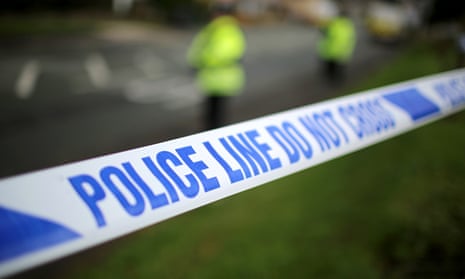A man arrested on Thursday as part of a counter-terrorism operation to thwart an alleged Islamist plot had previously been suspected of wanting to travel to Syria to team up with extremists, friends of his family said on Friday.
Counter-terrorism officers announced on Friday that they had arrested four men over an alleged terrorist plot, and were carrying out a series of raids in and around London. One theory officials are exploring was a that there was a plot to attack a forthcoming public event.
One possible target is the Remembrance Sunday ceremony in Whitehall, which is due to be attended by the prime minister and party leaders as well as other dignitaries.
MI5 and counter-terrorism police carried out three armed operations to disrupt suspected planning for a potential attack in the UK.
Armed police were sent to arrest two suspects and, in an unusual development, officers with guns arrested one suspect in the street.
Terrorism suspects are usually arrested at dawn in a residential address, to minimise the risk of harm to bystanders and of escape.
The third armed operation saw police raid the home of a suspect in High Wycombe, Buckinghamshire, hours after his arrest in west London.
Scotland Yard said the four men were arrested “on suspicion of being concerned in the commission, preparation or instigation of acts of terrorism”.
Three of the arrests were carried out in west London: a 22-year-old man was arrested in Hounslow, with armed officers present, a 25-year-old man was arrested in Uxbridge and a 27-year-old man was arrested in a car in Southall. Armed police also arrested a 19-year-old man in High Wycombe. The arrests were made between 8.30pm on Thursday with the last being made just before 3am on Friday. Police said that although armed officers were sent to make two of the arrests, no shots were fired. The 19-year-old is believed to be named Yousaf Syed.
Community sources said a property raided in High Wycombe had been targeted in April and a young man whose family lives there had later had his passport revoked.
A family friend said the man had been detained in April after security officials suspected he was intending to travel to Syria. He was not charged after that arrest, but weeks later he received a letter from the Home Office revoking his passport.
The man, whose family is of Pakistani heritage, is believed to have previously lived in London.
There was unease in High Wycombe at the scale of the raid. A family friend said: “Forty officers have gone into a pretty small house with a distressed family in there. An entourage of police descended, some with firearms.”
Police said searches at various sites in west London and High Wycombe were continuing, and that all four men were in custody at central London police stations.
They gave sparse details about the raids and said: “We are not prepared to discuss further at this time due to operational reasons.”
Police said officers are searching three addresses in High Wycombe as well as in Hounslow, Uxbridge, Southall, Greenford and Hayes in west London.
Some high-profile terrorism arrests in the past have been based on intelligence that has turned out to be untrue, and have led to accusations that police and MI5 have exaggerated the nature of plots.
A suspected plot can be disrupted if there is too great a chance of an attack being staged or because counter-terrorism officials believe they have enough evidence to proceed and test their suspicions through the courts and criminal justice system.
The fear of a terrorist attack being carried out by people with connections to Syria or Iraq led to the Joint Terrorism Analysis Centre (JTAC) recommending raising the terrorist threat level in August to severe, its second highest level.
